- Home
- Chuck Palahniuk
Invisible Monsters Page 11
Invisible Monsters Read online
Page 11
Evie, Evie would be dirt. Okay, ashes.
Alone in her living room, I pick up a crystal cigarette box off the table that looks like a block of malachite, and I overhand fast-pitch this little treasure against the fireplace bricks. There’s a smash with cigarettes and matches everywhere.
Bourgeoise dead girl that I am, I wish all of the sudden I hadn’t done this, and I kneel down and start to pick up the mess. The glass and cigarettes. Only Evie…acigarette box. It’s just so last-generational.
And matches.
A little tug hits my finger, and I’m cut on a shard so thin and clear it’s invisible.
Oh, this is dazzling.
Only when the blood comes out to outline the shard in red, only then can I see what cut me. It’s my blood on the broken glass I pull out. My blood on a book of matches.
No, Mrs. Cottrell. No, really, Evie wanted to be cremated.
I get up out of my mess, and run around leaving blood on every light switch and lamp, turning them all off. I run past the coat closet, and Manus calls, “Please,” but what I have in mind is too exciting.
I turn out all the first-floor lights, and Manus calls. He has to go to the bathroom, he calls. “Please.”
Evie’s big plantation house with its big pillars in front is all the way dark as I feel my way back to the dining room. I can feel the door frame and count ten slow, blind footsteps across the Oriental carpet to the dining room table with its lace tablecloth.
I light a match. I light one of the candles in the big silver candelabra.
Okay, it’s so Gothic Novel, but I light all five candles in the silver candelabra so heavy it takes both hands for me to lift.
Still wearing my satin peignoir set and ostrich feather bathrobe, what I am is the ghost of a beautiful dead girl carrying this candle thing up Evie’s long circular staircase. Up past all the oil paintings, then down the second floor hallway. In the master bedroom, the beautiful ghost girl in her candlelit satin opens the armoires and the closets full of her own clothes, stretched to death by the giant evil Evie Cottrell. The tortured bodies of dresses and sweaters and dresses and slacks and dresses and jeans and gowns and shoes and dresses, almost everything mutilated and misshapen and begging to be put out of its misery.
The photographer in my head says:
Give me anger.
Flash.
Give me vengeance.
Flash.
Give me total and complete justified retribution.
Flash.
The already dead ghost I am, the not-occurring, the completely empowered invisible nothing I’ve become, I wave the candelabra past all that fabric and:
Flash.
What we have is Evie’s enormous fashion inferno.
Which is dazzling.
Which is just too much fun! I try the bedspread, it’s this antique Belgian lace duvet, and it burns.
The drapes, Miss Evie’s green velvet portieres, they burn.
Lampshades burn.
Big shit. The chiffon I’m wearing, it’s burning, too. I slap out my smoldering feathers and step backwards from Evie’s master bedroom fashion furnace and into the second-floor hallway.
There are ten other bedrooms and some bathrooms, and I go room to room. Towels burn. Bathroom inferno! Chanel Number Five, it burns. Oil paintings of race horses and dead pheasants burn. The reproduction Oriental carpets burn. Evie’s bad dried flower arrangements, they’re these little tabletop infernos. Too cute! Evie’s Katty Kathy doll, it melts, then it burns. Evie’s collection of big carnival stuffed animals—Cootie, Poochie, Pam-Pam, Mr. Bunnits, Choochie, Poo Poo, and Ringer—it’s a fun-fur holocaust. Too sweet. Too precious.
Back in the bathroom, I snatch one of the few things not on fire:
A bottle of Valiums.
I start down the big circular staircase. Manus, when he broke in to kill me, he left the front door open, and the second-floor inferno sucks a cool breeze of night air up the stairs around me. Blowing my candles out. Now, the only light is the inferno, a giant space heater smiling down on me, me deep fried in my eleven herbs and spices of singed chiffon.
The feeling is that I’ve just won some major distinguished award for a major lifetime achievement.
Like, here she is, Miss America.
Come on down.
And this kind of attention, I still love it.
At the closet door, Manus is whining about how he can smell smoke, and please, please, please don’t let him die. As if I could even care right now.
No, really, Manus wanted to be cremated.
On the telephone message pad, I write in a minute i’ll open the door, but i still have the gun. before that, i’m shoving valiums under the door. eat them. do this or I’ll kill you.
And I put the note under the door.
We’re going out to his car in the driveway. I’m taking him away. He’ll do everything I want, or wherever we end up, I’ll tell the police that he broke into the house. He set the fire and used the rifle to kidnap me. I’ll blab everything about Manus and Evie and their sick love affair.
The word love tastes like earwax when I think it about Manus and Evie.
I slam the butt of the rifle against the closet door, and the rifle goes off. Another inch, and I’d be dead. With me dead outside the locked door, Manus would burn.
“Yes,” Manus screams. “I’ll do anything. Just, please, don’t let me burn to death or shoot me. Anything, just open the door!”
With my shoe, I shove the poured-out Valiums through the crack under the closet door. With the rifle out in front of me, I unlock the door and stand back. In the light from the upstairs fire, you can see how the house is filling up with smoke. Manus stumbles out, power blue bug-eyed with his hands in the air, and I march him out to his car with the rifle pressed against his back. Even at the end of a rifle, Manus’s skin feels tight and sexy. Beyond this, I have no plan. All I know is I don’t want anything resolved for a while. Wherever we end up, I just won’t go back to normal.
I lock Manus in the trunk of his Fiat Spider. A nice car, it’s a nice car, red, with the convertible top down. I slam the butt of the rifle against the trunk lid.
Nothing comes back from my love cargo. Then I wonder if he still has to pee.
I toss the rifle into the passenger seat and I go back into Evie’s plantation inferno. In the foyer, only now it’s a chimney, it’s a wind tunnel with the cold air rushing in the front door and up into the heat and light above me. The foyer still has that desk with the gold saxophone telephone. Smoke is everywhere, and a chorus of every smoke detector siren sirening is so loud it hurts.
It’s just plain mean, making Evie in Cancún lay awake so long for her good news.
So I call the number she left. You know Evie picks up on the first ring.
And Evie says, “Hello?”
There’s nothing but the sound of everything I’ve done, the smoke detectors and the flames, the tinkle of the chandelier as the breeze chimes through it, that’s all there is to hear from her end of the conversation.
Evie says, “Manus?”
Somewhere, the dining room maybe, the ceiling crashes down and sparks and embers rush out the dining room doorway and over the foyer floor.
Evie says, “Manus, don’t play games. If this is you, I said I didn’t want to see you anymore.”
And right then:
Crash.
A half ton of sparkling, flashing, white-light, hand-cut Austrian crystal, the big chandelier drops from the center of the foyer ceiling and explodes too close.
Another inch, and I’d be dead.
How can I not laugh. I’m already dead.
“Listen, Manus,” Evie says. “I told you not to call me or I’ll tell the police about how you put my best friend in the hospital without a face. You got that?”
Evie says, “You just went too far. I’ll get a restraining order if I have to.”
Manus or Evie, I don’t know who to believe, all I know is my feathers are on fire.<
br />
CHAPTER SIXTEEN
Jump way back to a fashion shoot at this junkyard full of dirty wrecked cars where Evie and me have to climb around on the wrecks wearing Hermaun Mancing thong swimwear so narrow you have to wear a “pussy strip” of surgical tape underneath, and Evie starts in with, “About your mutilated brother…?”
It’s not my favorite photographer or art director, either.
And I’m going back to Evie, “Yeah?” Busy sticking out my butt.
And the photographer goes, “Evie? That’s not pouting!”
The uglier the fashions, the worse places we’d have to pose to make them look good. Junkyards. Slaughterhouses. Sewage treatment plants. It’s the ugly bridesmaid tactic where you only look good by comparison. One shoot for Industry JeansWear, I was sure we’d have to pose kissing dead bodies.
These junked cars all have rusted holes through them, serrated edges, and I’m this close to naked and trying to remember when was my last tetanus shot. The photographer lowers his camera and says, “I’m only wasting film until you girls decide to pull in your stomachs.”
More and more, being beautiful took so much effort. Just the razor bumps would make you want to cry. The bikini waxes. Evie came out of her collagen lip injection saying she no longer had any fear of hell. The next worse thing is Manus yanking off your pussy strip if you’re not close-shaved.
About hell, I told Evie, “We’re shooting there tomorrow.”
So, now the art director says, “Evie, could you climb up a couple cars higher on the pile?” And this is wearing high heels, but Evie goes up. Little diamonds of safety glass are scattered on everywhere you might fall.
Through her big cheesy smile, Evie says, “How exactly did your brother get mutilated?” You can only hold a real smile for so long, after that it’s just teeth.
The art director steps up with his little foam applicator and retouches where the bronzer is streaked on my butt cheeks.
“It was a hairspray can somebody threw away in our family’s burning barrel,” I say. “He was burning the trash and it exploded.”
And Evie says, “Somebody?”
And I say, “You’d think it was my mom, the way she screamed and tried to stop him bleeding.”
And the photographer says, “Girls, can you go up on your toes just a little?”
Evie goes, “A big thirty-two-ounce can of HairShell hairspray? I bet it peeled half his face off.”
We both go up on our toes.
I go, “It wasn’t so bad.”
“Wait a sec,” the art director says, “I need your feet to be not so close together.” Then he says, “Wider.” Then, “A little wider, please.” Then he hands up big chrome tools for us to hold.
Mine must weigh fifteen pounds.
“It’s a ball-peen hammer,” Evie says, “and you’re holding it wrong.”
“Honey,” the photographer says to Evie, “could you hold the chainsaw a bit closer to your mouth, please?”
The sun is warm on the metal of the cars, their tops crushed under the weight of being piled on top each other. These are cars with buckled front ends you know nobody walked away from. Cars with T-boned sides where whole familes died together. Rear-ended cars with the back seats pushed up tight against the dashboard. Cars from before seatbelts. Cars from before air bags. Before the Jaws of Life. Before paramedics. These are cars peeled open around their exploded gas tanks.
“This is so rich,” Evie says, “how this is the place I’ve worked my whole life to get.”
The art director says to go ahead and push our breasts against the cars.
“The whole time, growing up,” Evie says, “I just thought being a woman would be…not such a disappointment.”
All I ever wanted was to be an only child.
The photographer says, “Perfecto.”
CHAPTER SEVENTEEN
What you get with the Rhea sisters is three skin-and-bone white men who sit around a suite at the Congress Hotel all day in nylon slips with the shoulder straps fallen off one shoulder or the other, wearing high heels and smoking cigarettes. Kitty Litter, Sofonda Peters, and the Vivacious Vivienne VaVane, their faces shining with moisturizer and egg-white facials, they listen to that step-to-three cha-cha music you only hear on elevators anymore. The Rhea sister hair, their hair is short and flat with grease and matted down bristling with bobby pins, flat on their heads. Maybe they have a wig cap stretched on over the pins if it’s not summer outside. Most of the time, they don’t know what season it is. The blinds aren’t ever open, and there are maybe a dozen of those cha-cha records stacked on the automatic record changer.
All the furniture is blonde and the big four-legged RCA Philco console stereo. The stereo, you could plow a field with that old needle, and the metal tone arm weighs about two pounds.
May I present them:
Kitty Litter.
Sofonda Peters.
The Vivacious Vivienne VaVane.
AKA the Rhea sisters when they’re onstage, these are her family, Brandy Alexander told me in the speech therapist office. Not the first time we met, this wasn’t the time I cried and told Brandy how I lost my face. This wasn’t the second time, either, the time Brandy brought her sewing basket full of ways to hide my being a monster. This was one of the other tons of times we snuck off while I was still in the hospital. The speech therapist office was just where we’d meet.
“Usually,” Brandy tells me, “Kitty Litter is bleaching and tweezing away unwanted facial hair. This unsightly hair thing can tie up a bathroom for hours, but Kitty would wear her Ray-Bans inside out, she loves looking at her reflection so much.”
The Rheas, they made Brandy what she is. Brandy, she owes them everything.
Brandy would lock the speech therapist door, and if somebody would knock, Brandy and me, we’d fake loud orgasm noises. We’d scream and yip and slap the floor. I’d clap my hands to make that special spanking sound that everybody knows. Whoever knocks, they’d go away fast.
Then we’d go back to just us using up make-up and talking.
“Sofonda,” Brandy would tell me, “Sofonda Peters, she’s the brains, Sofonda is. Miss Peters is all day with her porcelain nails stuck in the rotary-dial princess phone to an agent or a merchandiser, selling, selling, selling.”
Somebody would knock on the speech therapist door, so I’d give out with a cat scream and slap my thigh.
The Rhea sisters, Brandy would tell me, she’d be dead without them. When they’d found her, the princess queen supreme, she’d been a size twenty-six, lip-synching at amateur-night, open-mike shows. Lip-synching “Thumbelina.”
Her hair, her figure, her hippy, hippy forward Brandy Alexander walk, the Rhea sisters invented all that.
Jump to two fire engines passing me in the opposite direction as I drive the freeway toward downtown, away from Evie’s house on fire. In the rearview mirror of Manus’s Fiat Spider, Evie’s house is a smaller and smaller bonfire. The peachy-pink hem of Evie’s bathrobe is shut in the car door, and the ostrich feathers whip me in the cool night air pouring around the convertible’s windshield.
Smoke is all I smell like. The rifle on the passenger seat is pointing at the floor.
There’s not one word from my love cargo in the trunk.
And there’s only one place left to go.
No way could I call and just ask the operator to ring Brandy. No way would the operator understand me, so we’re on our way downtown to the Congress Hotel.
Jump to how all the Rhea sister money comes from a doll named Katty Kathy. This is what else Brandy told me between faking orgasms in the speech therapist office. She’s a doll, Katty Kathy is one of those foot-high flesh-tone dolls with the impossible measurements. What she would be as a real woman is 46-16-26. As a real woman, Katty Kathy could buy a total of nothing off the rack. You know you’ve seen this doll. Comes naked in a plastic bubble pack for a dollar, but her clothes cost a fortune, that’s how realistic she is. You can buy about four hundred tiny fash
ion separates that mix and match to create three tasteful outfits. In that way, the doll is incredibly lifelike. Chilling, even.
Sofonda Peters came up with the idea. Invented Katty Kathy, made the prototype, sold the doll, and cut all the deals. Still, Sofonda is about married to Kitty and Vivian and there’s enough money to support them all.
What sold Katty Kathy is that she’s a talking doll, but instead of a string, she’s got this little gold chain coming out of her back. You pull her chain, and she says:
“That dress is fine, I mean, if that’s really how you want to look.”
“Your heart is my piñata.”
“Is that what you’re going to wear?”
“I think it would be good for our relationship if we dated other people.”
“Kiss kiss.”
And, “Don’t touch my hair!”
The Rhea sisters, they made a bundle. Katty Kathy’s little bolero jacket alone, they have that jacket sewn in Cambodia for a dime and sell it here in America for sixteen dollars. People pay that.
Jump to me parking the Fiat with its trunk full of my love cargo on a side street, and me walking up Broadway toward the doorman at the Congress Hotel. I’m a woman with half a face arriving at a luxury hotel, one of those big glazed terra cotta palace hotels built a hundred years ago, where the doormen wear tailcoats with gold braid on the shoulders. I’m wearing a peignoir set and a bathrobe. No veils. Half the bathrobe has been shut in a car door, dragging on the freeway for the past twenty miles. My ostrich feathers smell like smoke, and I’m trying to keep it a big secret that I have a rifle tucked up crutch-like under my arm.
Yeah, and I lost a shoe, one of those high-heeled mules, too.
The doorman in his tailcoat doesn’t even look at me. Yeah, and my hair, I see it reflected in the big brass plaque that says The Congress Hotel. The cool night air has pulled my butter crème frosting hairdo out into a ratted stringy mess.

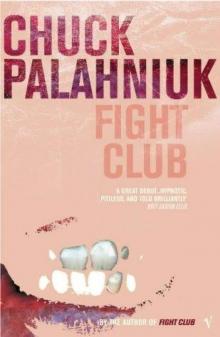 Fight Club
Fight Club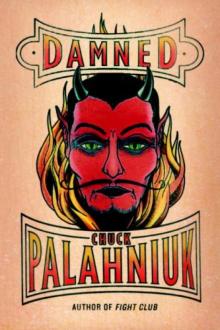 Damned
Damned Tell-All
Tell-All Choke
Choke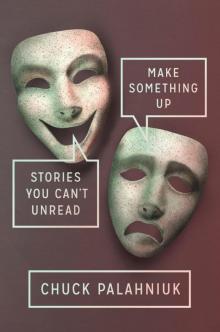 Make Something Up: Stories You Can't Unread
Make Something Up: Stories You Can't Unread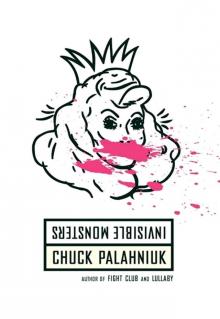 Invisible Monsters
Invisible Monsters Phoenix
Phoenix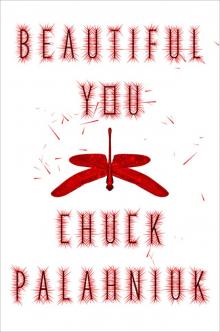 Beautiful You: A Novel
Beautiful You: A Novel Haunted
Haunted Survivor
Survivor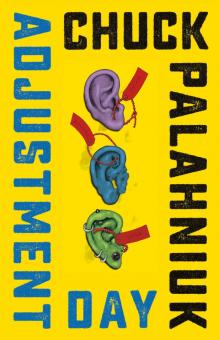 Adjustment Day
Adjustment Day Pygmy
Pygmy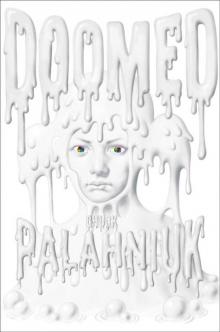 Doomed
Doomed Lullaby
Lullaby Snuff
Snuff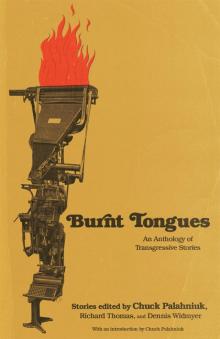 Burnt Tongues
Burnt Tongues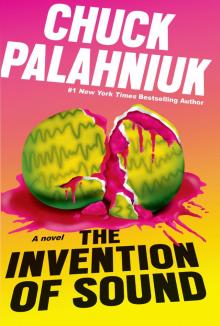 The Invention of Sound
The Invention of Sound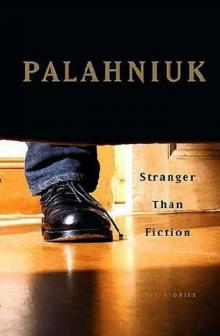 Stranger Than Fiction (True Stories)
Stranger Than Fiction (True Stories)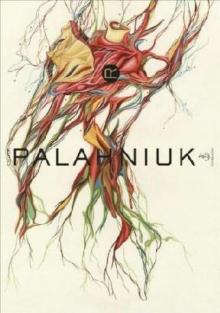 Rant: The Oral History of Buster Casey
Rant: The Oral History of Buster Casey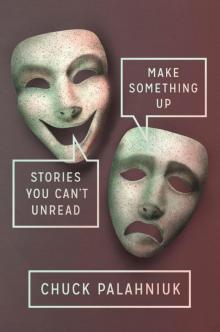 Make Something Up
Make Something Up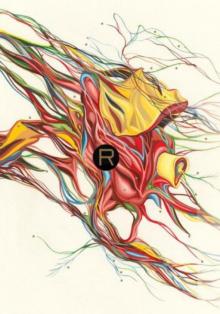 Rant: An Oral Biography of Buster Casey
Rant: An Oral Biography of Buster Casey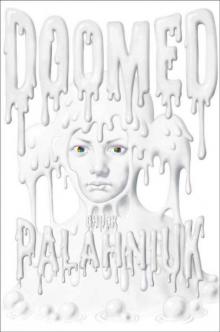 Doomed d-2
Doomed d-2 HOPE AND GORY
HOPE AND GORY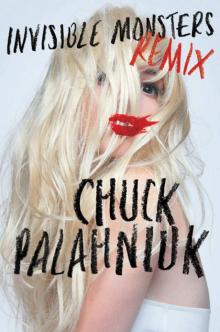 Invisible Monsters Remix
Invisible Monsters Remix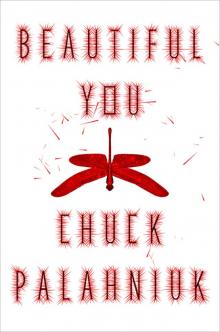 Beautiful You
Beautiful You Fugatives & Refugees
Fugatives & Refugees